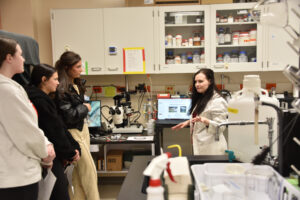AHA Sweethearts Visit Five Labs; Get Glimpse into the World of Cardiovascular Research
| About 40 Arkansas high school sophomores and juniors recently got an inside look at some of the cardiovascular research under way at the University of Arkansas for Medical Sciences (UAMS).
The sophomores are in the American Heart Association’s Sweethearts program, which aims to educate and empower a new generation to build healthier lives while developing a commitment to lifelong heart health, community service and leadership.
The students visited the UAMS Biomedical Research Building in two groups — half of them on the evening of Jan. 8 and the rest the following evening.
Each group then divided into smaller groups of three or four students that rotated among five laboratories, enabling all the students to get a close-up look at a variety of cardiovascular research projects.

The Sweethearts experiment with blood pressure equipment in the lab of Yunmeng Liu, Ph.D., far right, an assistant professor of pharmacology and toxicology.
Yunmeng Liu, Ph.D., an assistant professor of pharmacology and toxicology, along with her team members Katherine Deck, Christoph Mora and Tonya Rafferty, provided blood-pressure cuffs and taught students to check their own blood pressure while she explained how to interpret the readings. Liu discussed the importance of understanding hypertension to prevent the types of diseases that stem from it.
“Over time, hypertension can accumulate and cause irreversible damage in major organs like the kidneys and the heart,” Liu said, demonstrating with illustrations how the process occurs. She also described some methods used in her research, such as analyzing individual cells by flow cytometry to study both the cause of hypertension and the injuries induced by elevated blood pressure in the body.

Amanda Stolarz, Pharm.D., Ph.D., describes for students the significance of the research performed in her pharmaceutical sciences lab.
At another station, Amanda Stolarz, Pharm.D., Ph.D., an assistant professor of pharmaceutical sciences, told the students about the lymphatic system on the cardiovascular system, and how chemotherapy and hypertension increases the risk of developing lymphedema, which is associated with certain drugs including chemotherapies for cancer treatment.
“Once it has developed,” she said, “it’s lifelong.”
“We’re focused on developing treatments to prevent or reduce lymphedema,” she said as she stood alongside some of the equipment her team uses to study the underlying mechanisms that cause lymph vessels to contract. She said other researchers also are looking at strategies to prevent surgical damage to lymph vessels, which can result in lymphedema.
Abdelrahmam Fouda, Ph.D., an assistant professor of pharmacology and toxicology, discussed warning signs of a stroke and clues that his researchers find during examinations of healthy and injured retinas. Esraa Shosha from his group recently received $25,000 from the UAMS Sturgis Foundation for a project that aims to shed light on the underlying mechanisms of diabetic retinopathy, a leading cause of blindness.
In yet another laboratory, Kevin Phelan, Ph.D., a professor of neurobiology and developmental sciences, conducted a cardiac ultrasound on a standardized patient as students gathered around and watched live images of the patient’s heart and internal structures on a nearby screen. Phelan showed the students how moving the probe in a circular fashion across the patient’s chest and neck provided different anatomical images and let them practice.

Kevin Phelan, Ph.D., a professor of neurobiology and developmental sciences, demonstrates a cardiac ultrasound on a standardized patient.
“Ultrasounds are pretty cool because you can see everything,” he said.
The students also visited the lab of Nirmala Parajuli, DVM, Ph.D., an assistant professor of pharmacology and toxicology who in 2021 received a five-year $2.46 million grant from the National Institutes of Health (NIH) to study a drug therapy that could reduce damage to donated kidneys during cold storage, ultimately increasing long-term survival for renal transplant recipients.
The students in the AHA Sweethearts program had opportunities during each lab visit to ask questions, and some of them indicated they are considering future careers in research or medicine.
Nancy Rusch, Ph.D., distinguished professor and chair of the Department of Pharmacology and Toxicology in the UAMS College of Medicine, organized the recurring event this year — the second time since the beginning of the COVID-19 pandemic that the Sweethearts could attend in person.
